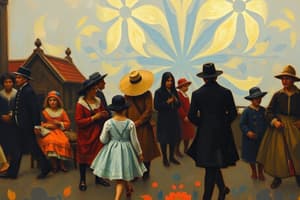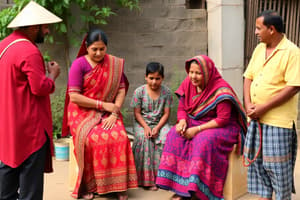Podcast
Questions and Answers
Which of the following is an example of a moral value?
Which of the following is an example of a moral value?
- Success
- Intelligence
- Integrity (correct)
- Ambition
What is a significant factor that influences the development of moral values?
What is a significant factor that influences the development of moral values?
- Political affiliations
- Technological advancements
- Financial status
- Cultural norms (correct)
Conflicting moral values can often lead to what outcome?
Conflicting moral values can often lead to what outcome?
- Agreement on legislation
- Universal acceptance of values
- Disagreements and ethical dilemmas (correct)
- Increased cooperation between cultures
Which of the following statements about moral values is correct?
Which of the following statements about moral values is correct?
What role do moral frameworks play in society?
What role do moral frameworks play in society?
What is the main way culture is transmitted through generations?
What is the main way culture is transmitted through generations?
Which aspect illustrates cultural diversity in visible forms?
Which aspect illustrates cultural diversity in visible forms?
How do traditions function within a culture?
How do traditions function within a culture?
What defines moral values in a society?
What defines moral values in a society?
In what way can culture evolve?
In what way can culture evolve?
Which of the following best describes a non-material tradition?
Which of the following best describes a non-material tradition?
Why is it important to recognize cultural variations?
Why is it important to recognize cultural variations?
What are the two main categories of traditions?
What are the two main categories of traditions?
Flashcards
Culture
Culture
Shared beliefs, values, customs, behaviors, and artifacts that define a group or society.
Traditions
Traditions
Established customs, beliefs, or practices passed down through generations within a culture.
Moral Values
Moral Values
Fundamental beliefs about what is right and wrong, good and bad, just and unjust.
What are moral values?
What are moral values?
Signup and view all the flashcards
How do moral values influence society?
How do moral values influence society?
Signup and view all the flashcards
What influences moral values?
What influences moral values?
Signup and view all the flashcards
How do moral frameworks help us?
How do moral frameworks help us?
Signup and view all the flashcards
Can moral values change?
Can moral values change?
Signup and view all the flashcards
Study Notes
Culture
- Culture encompasses shared beliefs, values, customs, behaviors, and artifacts characterizing a group or society. It's learned, not innate, and transmitted through generations.
- Culture shapes worldviews, interactions, and responses to situations.
- Cultures are diverse and complex, varying in traditions, languages, and social structures across societies.
- Cultural diversity exists visibly (clothing, food, music, architecture) and intangibly (values, beliefs, social norms).
- Culture evolves over time due to internal changes and external interactions.
- A culture significantly influences individual behavior, dictating appropriate social interactions, acceptable behaviors, and preferred lifestyles.
- Cultural transmission occurs through family, education, media, and social interactions.
- Culture is dynamic, adapting to changing circumstances and external influences.
Traditions
- Traditions are established customs, beliefs, or practices passed down through generations within a culture.
- Examples include holidays, rituals, ceremonies, storytelling, music, art, and social customs/etiquette.
- Traditions reinforce community identity and values, provide structure and continuity, and mark life events.
- Traditions relate to religious practices, historical events, and cultural figures, connecting to history and creating shared heritage.
- Traditions vary considerably between and within cultures.
- Traditions are material (crafts, clothing, artifacts) and non-material (values, beliefs, rituals).
Moral Values
- Moral values are fundamental beliefs about right/wrong, good/bad, and just/unjust.
- These values guide individual behavior and shape societal norms.
- Moral values vary across cultures and historical periods. What's moral in one place might not be in another.
- Examples include honesty, compassion, respect, responsibility, fairness, and courage.
- These values influence societal laws and regulations, often reflecting the cultural landscape.
- Moral value development is influenced by family, religion, culture, and personal experiences.
- Moral frameworks provide standards for decisions and social interaction.
- Moral values underpin social order, such as respecting property for peaceful coexistence.
- Conflicting moral values lead to disagreements and ethical dilemmas, especially in intercultural interactions.
- Moral values adapt and re-evaluate as societies shift, debating contemporary issues like technology and globalization.
Studying That Suits You
Use AI to generate personalized quizzes and flashcards to suit your learning preferences.





